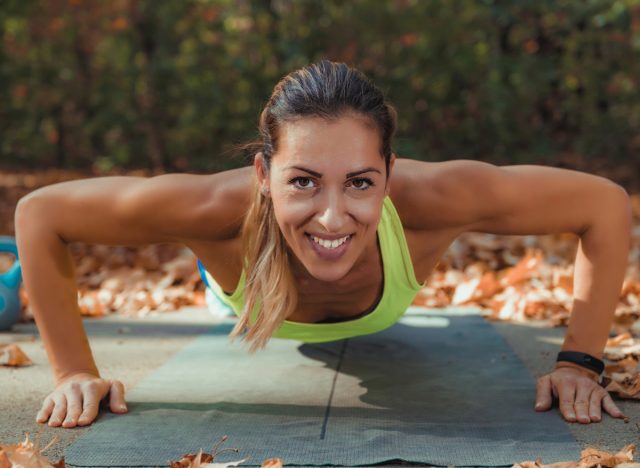This One Workout Drives 29 Percent More Fat Loss, Says Science

It's an eternal question for which you'll find countless answers: What's the single best workout for losing weight? Some urge you to walk. Others say you need to lift weights to build muscle mass—which in turn burns more fat. (Spoiler alert: They're not wrong.) Others say that hopping on the treadmill is your surest way to torch more calories. Others astutely note that the single greatest exercise for losing weight is doing what you love that will result in you actually doing it.
But according to a meta-analysis of more than 786 studies on the subject published in The British Journal of Sports Medicine, there is a different answer (assuming you're eating the right foods and not the wrong ones): interval training. "Interval training and [moderate-intensity continuous training (MOD)] both reduce body fat percentage," conclude the researchers. "Interval training provided 28.5% greater reductions in total absolute fat mass than MOD."
In another meta-analysis published in the journal Sports Medicine, researchers found that high-intensity interval training (HIIT) "significantly reduced total, abdominal, and visceral fat mass, with no differences between the sexes," while also noting that exercise that forced people to exceed "90% peak heart rate" (in other words: it's really intense exercise) was the most effective in losing weight. "HIIT is a time-efficient strategy to decrease fat-mass deposits, including those of abdominal and visceral fat mass," the researchers conclude.
The researchers also noted that running and sprinting were more effective than cycling in "reducing total and visceral mass."
These studies are among several that extol the benefits of interval training, which is defined as doing short bursts of rigorous, rapid-fire exercise. "If people are looking to improve performance in the most time-effective way, and if they're looking to improve health in the most time effective way, then I think incorporating interval training is a very good strategy," says Martin Gibala, Ph.D., professor of kinesiology at McMaster University in Hamilton, Ontario, and perhaps the world's foremost expert on the science of high-intensity interval training.
If you're interested in trying a running and sprinting HIIT workout, read on, because we've included a great one right here. And for more great workout news, make sure you're fully up to speed on The Morning Workout That Melts Fat All Day Long, According to Experts.
Warmup

Though many don't stretch before jogging, you'd be wise to stretch before sprinting. You'll warm and loosen your muscles, and you'll drastically lower your chance of injury. Start with either jogging in place for several minutes or taking a few laps on a track. You'll get your heart rate up, and sweat should begin to accumulate lightly on your body.
Then you should march with high knees—taking exaggerated steps in which you bring your knees as high as you can, up to your waist. Do this for one to two minutes.
Once you've done that, shift to forward lunges. For these, stand with your feet together, and pull your shoulders down and back. Then take a step forward with one leg, landing on the heel first. Load the leg and drop down, keeping your balance and holding the position for three seconds. Then return to starting position. Do these 15 times. Follow them with side lunges, in which you take side steps with bent knees and a straight back in both directions. Do 20 times total.
Perform 8 to 10 Sprints of 20 Yards

Run at slightly less than your absolute top speed for safety. Rest as needed between sets—keep your heart rate elevated but allow yourself enough recovery that you can go fast. As you increase your conditioning and fitness level, add on more sprints and lengthen the distance.
If You're New to Sprinting…

Or haven't done it in a while, do your sprints on a hill. Start with 5 sprints and run only at a moderate pace and build up from there.
Use Proper Form

Land on the balls of your feet as your sprint—not your heels. Your front foot should land directly beneath you. Your arms should pump vigorously forward and backward as you run, and never cross the midline of your body. Let your hands come up to face level and then back to your pockets, but no farther. Keep your shoulders and hips level so there's no side-to-side rotation in your torso. And for more advice that will help you burn fat, don't miss these Sneaky Weight Loss Tricks That Actually Work, According to Experts.








